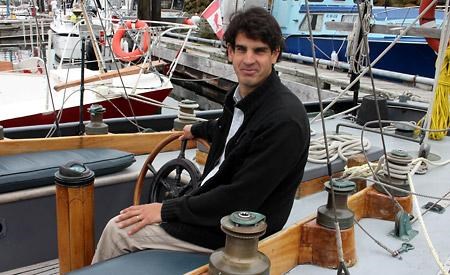Classic wooden boats could be a value-added attraction at Powell River’s revamped south harbour, according to the owner of a historical sailing ship.
Stephen Mohan, a professional Shipwright who specializes in wooden vessels, envisions a designated maritime heritage dock in the first finger of the reconfigured south harbour at the former barge terminal site. He thinks if the dock were set aside for wooden vessels, it could become the centre of an active and educational attraction that would draw tourists from around the world. “It creates an active working harbour,” Mohan said. “It brings locals down to the docks and it promotes maritime education.”
Mohan, along with his wife Barbra, owns the Carlotta, a 112-year-old, 60-foot long classic wooden sailboat built in England. It is one of the oldest and prettiest sailboats on the coast, Mohan said, and is very well known in wooden boat circles. Originally it was a Bristol Channel pilot cutter, used by officers to patrol the fisheries in the Cumberland area. It was built in 1899 by William Henry Halford in Gloucester, England.
Just this August, Mohan finished the restoration of the boat, a project that took almost seven years to the day that he and Barbra took possession of it.
Mohan had his boat open to the public at this summer’s Spot Prawn Festival at Willingdon Beach. In four hours, he had over 400 people tour it. “There are not many English work boats in North America,” he said. “There are only 18 of her type of vessel left and most are in the United Kingdom.”
Mohan has had people come from England to visit the Carlotta. “Other wooden boat owners are drawn to her. In the last two weeks, six people have come to Lund to tie up next to her.”
Other coastal communities have similar dock space for their heritage vessels. Friday Harbour has given the most prominent spots in its docks to the classic wooden schooners Spike Africa and Dirigo II. “They are a giant draw for tourists and greatly increase the beauty of the harbour,” said Mohan. “In many European communities, the pretty wooden vessels are given free dock space at the forefront of the harbour as they are a tourist draw and spectacles of beauty that everyone wants to enjoy.”
In return for the free dock space, the owners of the vessels would open their boats and offer their skills as part of an educational program for the public, Mohan added.
The Powell River area has several classic vessels “gracing our waters,” Mohan said. “If we embrace these boats and encourage them to stay here, they will attract others as well.”
For example, the Maryke Violet is a lovely 53-foot schooner that calls Powell River home. Owned by Jim Sepkowski, the 53-foot schooner was built in Nova Scotia. It is one of the fastest wooden boats on the coast, said Mohan, and regularly cleans up on all of the wooden boat regattas on the coast.
“Imagine the Maryke Violet, the Carlotta and a smattering of classic motor yachts and working wooden fish boats all sharing the same finger of the south harbour dock,” he said. “Folks would naturally be drawn to the area by the towering 60-foot high wooden masts alone.”
Once a month, a different boat could host an open house. There could also be demonstrations on the dock of oar making, rope work, woodworking, stitching leatherwork or rigging.
Having a maritime heritage dock could spawn other activities, Mohan believes, such as an annual wooden boat festival. “Visiting wooden boats can open their doors to the public for tours and ‘hands-on’ demonstrations. Food vendors and local live music could take place in the area above the dock at the old barge terminal building.”
A wooden boat festival could take place in tandem with the Blackberry Festival, Spot Prawn Festival or Sea Fair, Mohan added. Currently, the Sunshine Coast Wooden Boat Festival changes locations annually on the coast. Mohan believes it’s possible that it could find a permanent home in Powell River.
Mohan is volunteering his services to organize and manage the maritime heritage dock and the Powell River Wooden Boat Festival. He can design and build appropriate signage for the dock and sign-board descriptions for the heritage vessels on display.
If the festival came to Powell River, Mohan said, it would help attract members of the West Coast Work Boat Association. They get together twice a year, in the spring and fall, for a rendezvous, with their tug boats, ferries and fishing boats. Mohan has contacted them, suggesting they come to Powell River for their fall 2012 rendezvous. “They expressed interest,” he said. “They wanted to know details.”
Mohan also believes the maritime heritage dock could draw in partners. He has contacted the Powell River Association for Community Living about the possibility of involving its clients in different capacities, such as guides or for maintenance. The dock could also be a stop on Tla’Amin (Sliammon) First Nation’s tribal canoe journey.
Mohan has made presentations about his idea to the City of Powell River’s committee-of-the-whole and its Westview waterfront development committee. “They were very receptive to the idea,” he said.
Mohan will be meeting with Dave Douglas, the city’s director of financial services, to hammer out the details of the costs of his proposal. He expects he’ll have more details sometime in September.
Meanwhile, Mohan and the Carlotta will be part of the 35th Annual Port Townsend Wooden Boat Festival from September 9 to 11.
Interested readers who would like more information about the Carlotta can visit the website.



